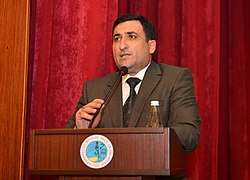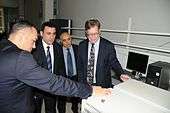Mustafa Babanli
Mustafa Babanlı (Azerbaijani: Mustafa Baba oğlu Babanlı; born February 21, 1968), is an Azerbaijani scientist, Rector of the Azerbaijan State Oil and Industry University.
Mustafa Babanli | |
|---|---|
 | |
| Born | Mustafa Babanli February 21, 1968 Saatli, Azerbaijan SSR |
| Alma mater | Kyiv Polytechnic Institute |
| Scientific career | |
| Fields | Physics, metallurgy, shape memory alloys |
| Institutions | Azerbaijan State Oil and Industry University |
Education and academic career
Mustafa Babanli was born to a family of teachers in Saatli, Azerbaijan SSR on February 21, 1968. Upon graduation from a high school of physics and mathematics profile in 1983, he entered he faculty of Engineering and Physics, Faculty of Physics of Metals at Kyiv Polytechnic Institute. Following his cum laude graduation, he started his career as an engineer-technologist at Kristal Special Design Bureau under the Azerbaijan National Academy of Sciences.
Mustafa Babanli received post-graduate education at the Institute of Physics of Metals of the National Academy of Sciences of Ukraine in 1990-1992 and earned PhD in physics and mathematics, having defended his thesis "Phase transformations in extremely rapidly cooled TiNiCu alloys" in 1993. After returning to his homeland, Azerbaijan in 1996, Mustafa Babanli got employed at the Azerbaijan Technical University, where he has been working ever since.
On November 4, 2010, Mustafa Babanli was appointed Vice-Rector for International Relations. On December 29, 2010, he was elected professor of the Metallurgy and Metal Sciences Chair. At present, he works as a scientific advisor to a doctoral thesis and 4 PhD theses.
Mustafa Babanli defended his doctoral thesis at the Dissertation Council of the Technical University on 27 February 2008 and received his degree of Doctor of Technical Sciences on January 23, 2009. At present, he is a member of the above-mentioned Dissertation Council.
On September 3, 2015, Mustafa Babanli was appointed Rector of the Azerbaijan State University of Oil and Industry.[1] [2] He is a member of the International Association of University Presidents,[3] serving as Regional Chair for Middle East, Caucasus & Central Asia.[4]
Scientific activities

His scientific activities are carried out mainly in following directions:
- Development of massive amorphous alloys;
- Development of shape memory alloys;
- Development of materials using new technologies;
- Development of nanostructured shape memory alloys.
M. Babanli has published 138 scientific and methodical works. He also authors 2 patents, 1 textbook, 2 manuals, 1 monograph and 3 syllabus.
Since 1994, he has been closely cooperating with the Institute of Physics of Metals of the National Academy of Sciences of Ukraine (Kiev), the Chimie ParisTech (Paris, France), the University of the Balearic Islands (Palma de Mallorca, Spain), the Technische Universität Bergakademie Freiberg (Freiberg, Germany). Within the framework of this cooperation, he led several international scientific projects, including STCU-453 (1997-1999), Dnipro (1999-2002), ECONET (2002-2005), STCU-3520 (2006-2009), CNRS-ANAS (2009-2010), CNRS-ANAS (2010-2011), STCU-5078 (2010-2011) and STCU-5595 (2012-2013).[5]
Personal life
Mustafa Babanli is married and has 3 children (2 daughters and a son). He is a younger brother of Mahammad Babanli, another prominent scholar and member of the National Academy of Sciences of Azerbaijan. His uncle Vidadi Babanli is a well-known writer.
See also
- Azerbaijan Technical University
- Kyiv Polytechnic Institute
- Azerbaijan State Oil and Industry University
External links
- Vice Rector (in Azeri)
References
- Rector of the Azerbaijan State University of Oil and Industry appointed
- Azerbaijani President renames State Oil Academy
- "Archived copy". Archived from the original on 2014-04-04. Retrieved 2014-04-04.CS1 maint: archived copy as title (link)
- IAUP Executive Committee
- Fransa-Azərbaycan birgə elmi layihəsi davam edir